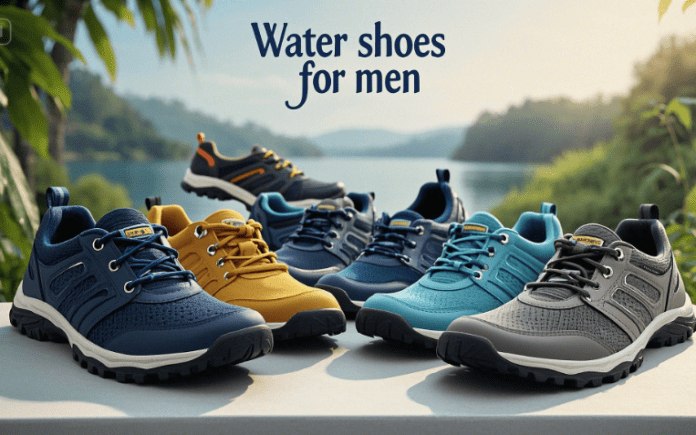Last Updated on February 7, 2026 by maryamnawaz
Table of Contents
Introduction
One item often goes overlooked when exploring the great outdoors: Water Shoes for Men. These specialized shoes are more than just a footwear choice—they’re a game-changer for anyone venturing into aquatic or mixed-terrain environments.
Whether navigating rocky shores, trekking through muddy trails, wading in rivers, or simply enjoying a casual day at the beach, the right pair of water shoes can dramatically enhance your experience. They provide unparalleled comfort, robust protection against sharp objects and slippery surfaces, and an overall boost in confidence as you tackle various terrains.
In this guide, we’ll dive deep into everything you need to know about water shoes for men, from their benefits and types to essential features and maintenance tips, ensuring you make an informed choice for your next adventure.
| Aspect | Details |
| Purpose | Provides protection, comfort, and functionality for water and land activities |
| Materials | Quick-drying mesh, neoprene, and synthetic blends |
| Benefits | Non-slip soles, lightweight design, and versatile usage |
| Activities | Beachcombing, hiking, water sports, fishing, snorkeling, river trekking |
| Care Tips | Rinse after use, air dry, clean regularly, and store properly. |
| Durability | Designed for prolonged use in wet and rugged conditions |
| Versatility | Suitable for diverse activities, from casual outings to extreme adventures |
| Style Options | Available in sporty, casual, and hybrid designs |
Understanding Water Shoes
What Are Water Shoes?
Water shoes are specialized footwear designed for water-related activities. They are typically made from quick-drying materials, have non-slip soles, and are lightweight, making them ideal for water-based sports and activities. Unlike traditional sneakers or sandals, water shoes offer a combination of protection, comfort, and functionality in wet environments.

Why You Need Water Shoes
Water shoes serve multiple purposes:
- Protection: They shield your feet from sharp rocks, coral, and other hazards in the water.
- Traction: The non-slip soles provide grip on wet surfaces, reducing the risk of slips and falls.
- Comfort: Lightweight and breathable materials ensure comfort during prolonged use.
- Quick Drying: These shoes are designed to dry quickly and prevent discomfort associated with wet footwear.
Environmental and Terrain Considerations
When choosing water shoes, it’s important to consider the specific environments you’ll be navigating. Shoes designed for rocky or coral-filled areas should feature reinforced soles to protect against punctures, while those meant for sandy beaches or calm rivers can prioritize lightweight flexibility and breathability.
Additionally, water shoes with quick-drain features help prevent discomfort in fast-flowing streams or wet trails, reducing the risk of blisters and enhancing overall mobility. By matching your water shoes to the terrain, you ensure maximum safety, comfort, and performance on every adventure.
Features to Look For in Water Shoes
When selecting the perfect pair of water shoes, consider the following features:
1. Material
Water shoes are typically made from neoprene, mesh, and rubber. Neoprene offers insulation and flexibility, while mesh promotes breathability and quick drying. Rubber soles provide traction and durability.
2. Fit and Comfort
A good fit is crucial for water shoes. Look for options with adjustable straps or elastic bands for a secure fit. Comfort is key, especially if you plan to wear them for extended periods.
3. Sole Type
The sole should be designed for traction on wet surfaces. Look for shoes with a patterned rubber outsole to enhance grip. Some boots also have drainage holes to allow water to escape, preventing slippage.
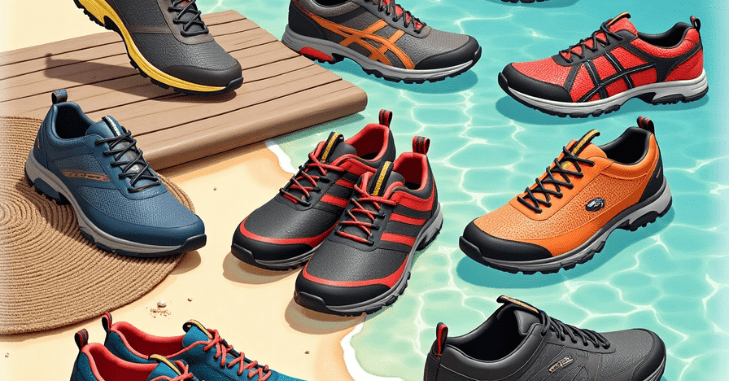
4. Weight
Water shoes should be lightweight to enhance mobility and comfort. Heavier shoes can hinder your performance during water activities.
5. Style
While functionality is essential, the Style also matters. Many brands offer water shoes in various colors and designs, allowing you to express your style while enjoying your favorite water activities.
Types of Water Shoes
Water shoes come in various styles, each suited for different activities. Here are some of the most common types:
1. Aqua Socks
Aqua socks are lightweight, flexible, and designed to fit snugly like a second skin. They are perfect for activities like paddleboarding or beach walking. While they provide minimal protection, they excel in comfort and portability.

2. Water Sandals
Water sandals combine the breathability of sandals with the protection of water shoes. They feature adjustable straps and rubber soles for traction. Ideal for hiking near water or casual beach outings, these sandals offer versatility.
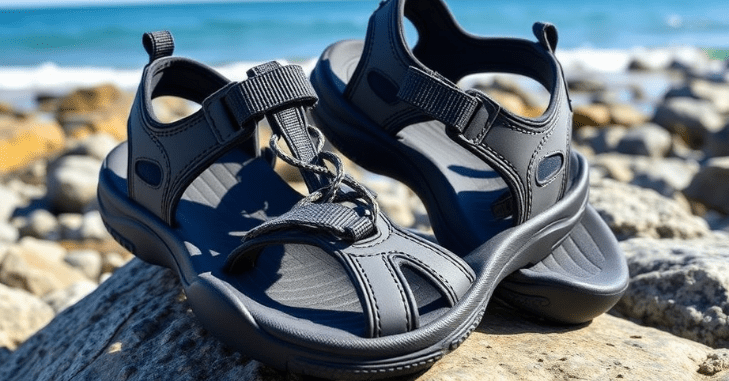
3. Closed-Toe Water Shoes
These shoes provide full coverage and protection, making them suitable for rugged activities like river rafting or climbing over rocky surfaces. The closed-toe design protects your toes while ensuring comfort and stability.
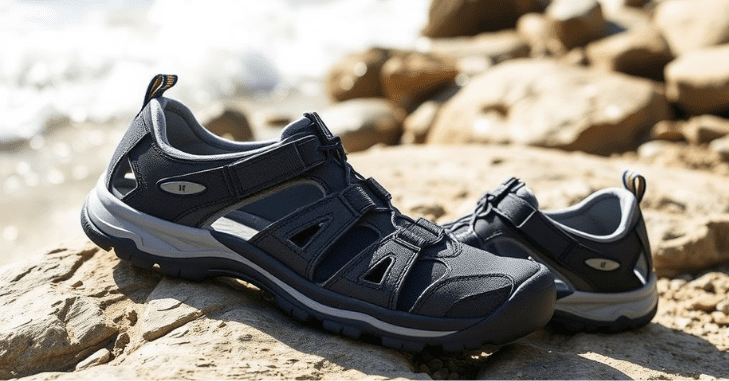
4. Water Sneakers
Water sneakers offer the best of both worlds: the comfort of a sneaker with the functionality of a water shoe. They feature breathable materials, cushioned insoles, and durable outsoles, making them great for various water activities.

5. Slip-On Water Shoes
Slip-on water shoes are convenient and easy to wear. They typically feature elastic bands for a snug fit and are perfect for quick trips to the pool or beach. Their lightweight design makes them a popular choice for casual water activities.
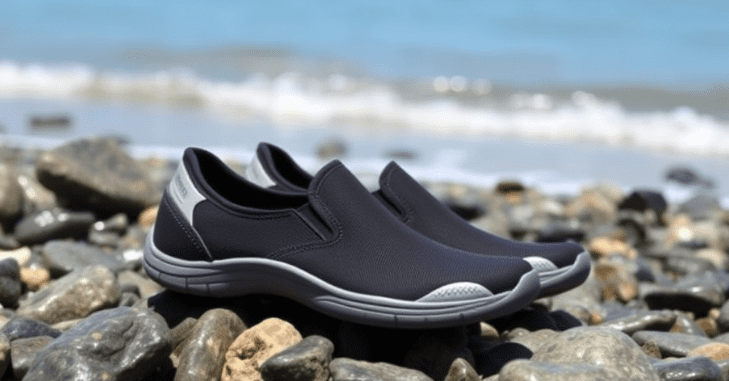
Pros and Cons of Water Shoes
| Pros | Cons |
| Protect feet from sharp objects. | Some styles lack arch support. |
| Provide excellent grip on wet surfaces. | It may not be as durable as hiking boots. |
| Quick-drying and breathable materials | It can be expensive, depending on the brand. |
| Lightweight and easy to carry | Limited insulation in colder waters |
| Versatile for various activities | It might not offer the best aesthetics. |
Benefits of Wearing Water Shoes
Water shoes offer several significant benefits that enhance your aquatic experience. First, they improve safety by reducing the risk of injuries from sharp objects, slippery surfaces, and uneven terrain, allowing you to explore marine environments confidently.
Secondly, the right pair of water shoes can improve your performance, enabling you to move more efficiently while swimming, kayaking, or engaging in other water sports, thanks to their lightweight design and superior grip. Additionally, these shoes are designed for comfort in wet conditions; they dry quickly and help prevent the discomfort associated with soggy socks and shoes.
Another advantage is their versatility. Many water shoes suit various activities, from beach outings to hiking, making them a worthwhile investment. Finally, with a wide array of styles and colors available, you can easily find water shoes that match your Style, allowing you to look good while enjoying your favorite water activities.
Top Picks for Water Shoes for Men
Here are some of the best water shoes currently available based on various factors like comfort, performance, and Style:
1. Merrell Hydro Moc
The Merrell Hydro Moc is a popular choice for its comfort and durability. Made from EVA material, it is lightweight, easy to clean, and features a slip-resistant sole. The unique design ensures a secure fit while providing breathability.
2. Keen Newport H2 Sandal
The Keen Newport H2 is a closed-toe sandal designed for water activities. Its quick-drying webbing and cushioned footbed offer comfort, while the rugged outsole ensures excellent traction on wet surfaces. This sandal is perfect for hiking near water.
3. Adidas Outdoor Terrex Climacool
The Adidas Terrex Climacool is a versatile water shoe suitable for various activities. Its breathable mesh upper and cushioned midsole provide comfort, while the rubber outsole offers excellent grip. This shoe is perfect for both water sports and casual outings.
4. Vibram FiveFingers V-Aquafit
For those who prefer a more minimalist approach, the Vibram FiveFingers V-Aquafit offers a unique experience. These shoes feature individual toe compartments for a natural feel, making them ideal for activities like kayaking and paddleboarding.
5. Columbia Drainmaker IV
The Columbia Drainmaker IV is designed for maximum drainage and quick drying. Its lightweight mesh upper and cushioned insole provide comfort, while the rubber outsole offers great traction. This shoe is perfect for river activities and casual beach outings.
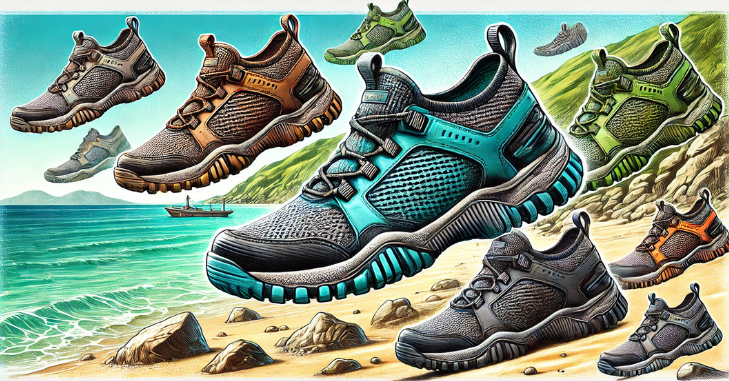
How to Care for Your Water Shoes
- Rinse After Use: Always rinse your water shoes with fresh water after using them in saltwater or chlorinated water to remove any damaging salt or chemicals.
- Air Dry: After rinsing, allow your water shoes to air dry completely. Avoid direct sunlight, as it can cause fading and damage to the materials.
- Clean Regularly: Clean your water shoes with mild soap and water, depending on the material. Check the manufacturer’s instructions for specific cleaning guidelines.
- Store Properly: When not in use, store your water shoes in a cool, dry place to prevent mold and mildew. Avoid folding or compressing them to maintain their shape.
Tips for Choosing the Right Water Shoes
Consider Your Activities
Think about the specific activities you plan to engage in. If you plan to hike near water, opt for closed-toe shoes or sandals with excellent traction. Lightweight aqua socks or slip-on water shoes may suffice for casual beach outings.
Try Before You Buy
Whenever possible, try on water shoes before purchasing. Ensure they fit comfortably and securely, with enough room for your toes to move without feeling cramped.
Check for Reviews
Research customer reviews and ratings to gauge the performance and comfort of different water shoe models. This can help you make an informed decision.
Set a Budget
Water shoes come in a range of price points. Determine your budget before shopping; investing in quality footwear can enhance your experience and longevity.
Don’t Sacrifice Style
While functionality is essential, remember Style. Water shoes are available in various designs, so you can find a pair that suits your taste.
Conclusion
Water shoes are an essential part of any man’s aquatic adventure gear. By understanding the different types, features, and benefits, you can decide which shoes are right for you.
Whether swimming, hiking, or enjoying a beach, the right pair of water shoes will enhance your experience by providing comfort, safety, and Style. So dive in, explore the waters, and confidently enjoy your adventures!
Apart from that if you want to know about “4 Best Trendy Affordable Training Shoes for Men Ruling 2023” then please visit our “Fashion” Category.
FAQs
Many water shoes, especially hybrid designs, are suitable for hiking. They offer excellent grip, quick-drying capabilities, and wet or mixed terrain protection.
Water shoes aren’t always necessary for swimming but are beneficial in environments with sharp objects, rocks, or slippery surfaces.
Choose a size that provides a snug fit without being too tight. Many brands offer size guides to help you find the perfect fit.
Yes, water shoes are designed to be worn without socks. However, you can wear water-resistant socks if you prefer extra comfort or protection.

